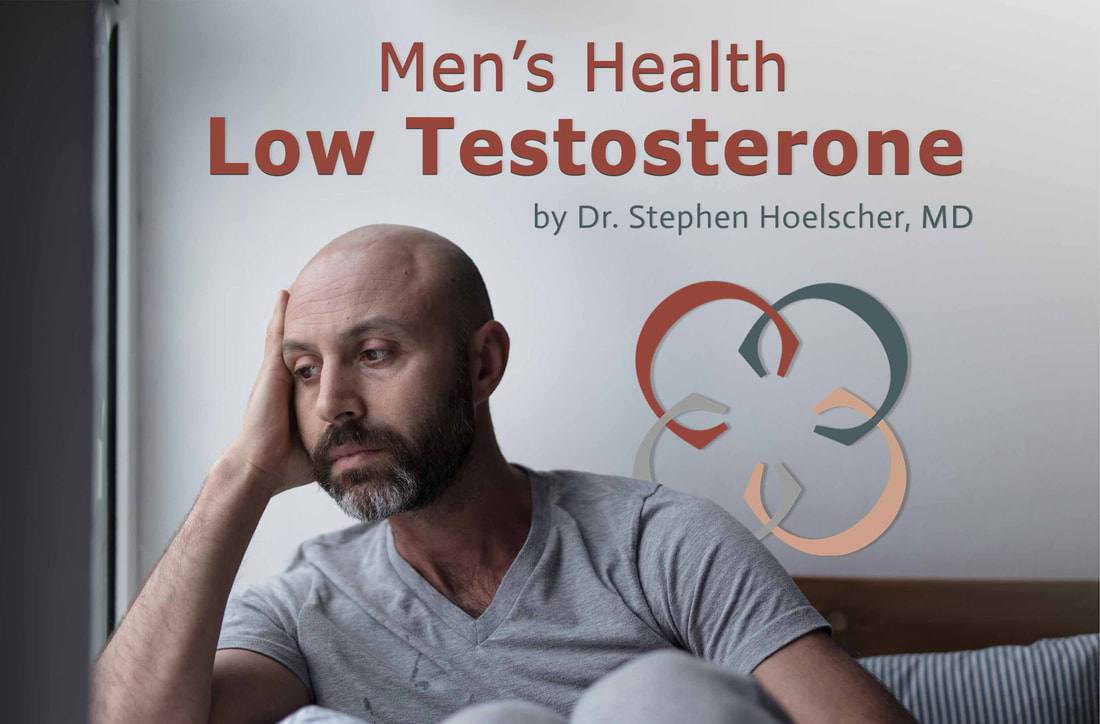|
Hello to all the men out there! I’d like to spend some time discussing an important topic with you and your spouses today. A common request I get in my practice from men involves checking for low testosterone. The majority of the time, men ask to check this as they symptoms of fatigue or low energy, depressed mood, weight gain, feeling weaker than usual, or performance issues sexually. It is a common misconception that these symptoms in combination are mostly caused by low testosterone. While indeed that can be the case, oftentimes it is not. So what distinguishes these symptoms being caused by other more common problems versus low testosterone? It is the physical signs on a man’s body. I encourage you men out there to keep an eye out for these signs as if you have these present, it lends much more towards a low testosterone level that can be treatable. The signs to watch out for are an enlargement of breast tissue, reduced testicle size, erectile dysfunction, low muscle mass (atrophy), hair loss, decreased libido or low sex drive. Individually, these signs do not necessarily point to low testosterone but together, they are much more likely to be an indication to get tested. So why is it important to look for these signs before requesting to have a testosterone level checked? Well, sometimes in medicine, our lab values are not always correct. Whether the error comes from the lab itself or the timing of the draw or a temporary physiological change in the person’s blood being tested (like recovering from a recent illness), the results may signify a false positive (or even a false negative). I want to focus on false positive results here. Most of the time we can figure out if it is a false positive or not, but there are occasions where a man can get misdiagnosed with low testosterone when in fact he does not have it. And therefore, testosterone supplements are given when they are not needed. Why the big deal though? It has been well studied and documented that treating someone without low testosterone raises that man’s risk for heart disease and stroke due to “thicker” blood, prostate overgrowth, and increased risk for a sleeping disorder we call sleep apnea where one temporarily stops breathing while sleeping which recurs throughout the night. Not to mention, administered testosterone can lead to infertility issues for younger men. Treating someone whose source of symptoms is not due to testosterone deficiency will only raise that man’s risk for these diseases and hardly help solve his problem. Men can begin to distinguish whether they think their symptoms are from a low testosterone level or not by careful examination of oneself. I always encourage you all to make an appointment for a more formal examination if there are any questions or doubts about your self-examination. Now let’s delve into the ways men can improve their testosterone levels naturally or on their own as it is very common for men to at least worry about eventually having low testosterone levels sometime in the future. What is one to do about “andropause?” Every year that goes by, men lose 1-2% of their total testosterone levels (but good news is that they usually do not lose enough by aging alone). A common cause for low testosterone is weight gain. A lot of men presume that it is the opposite cause and effect, and to an extent that is true. However, usually the weight gain is the primary cause of low testosterone (not to mention erectile dysfunction) and then the low testosterone then promotes further weight gain getting men into an undesired cycle. So it should come as no surprise that one of the first things men should focus on is achieving and/or maintaining a healthy weight! I will delve into more detail about that topic in a future blog. But starting with a diet of unprocessed healthy food groups along with sufficient hydration and avoiding processed foods with added sugars and unhealthy fats is a good place to start! The next cause is anabolic steroid use. You would be surprised that approximately 7% of males in general use steroids for increased muscle mass, improved energy, etc. It is not just a problem with “work-out junkies” as one would reasonably think. Steroids lead to decreased natural production by interrupting the feed-back system. It is like receiving approved medication for a false low level of testosterone as noted above. You get the same baggage of infertility and other complications of steroid use but it can lead to actual low testosterone levels too. Obviously, avoidance of these supplements or stopping them is the necessary step to take. Long-time illnesses/diseases can also be a source for low testosterone like diabetes, liver diseases, and opioid use for treatment of chronic pain. A lot of these are addressed naturally through a healthy diet, nutritional supplements when needed and adequate physical activity. Specifics of each condition can be further addressed by your primary care physician. Lastly, natural aging can lead to low testosterone. In addition to the mentioned above recommendations, the best thing to combat this is to stay active physically, mentally and emotionally. Eat a healthy diet, maintain a healthy exercise routine, work on reducing the number of medications you take (especially pain medications) through natural interventions to fix those respective chronic illnesses. Balance your life between your family, friends and co-workers. Avoid unnecessary stress in your life. Find time to relax each day in a healthy way. My suggestion is to ensure you get adequate “outside-time.” Listen to nature or play natural sounds within the home. Play classical music regularly. Counsel and help one another which will also help you in your mental health. Maintain a healthy balance of all of these things and you will find improvements in your body’s natural production of testosterone. I do realize that there are underlying genetic disorders and other inherited conditions that a man cannot control directly. It is sometimes a man’s life to suffer the effects of low testosterone even when he manages it as best as he can given these circumstances. I encourage those who suffer this circumstance to suffer well. What does that mean? It means to accept what God has allowed to happen in your life and to do your best to not let it take over your life but to make the best of the situation. Become an inspiration for others to take on their own personal sufferings of this life and become the best versions of themselves. I hope this has helped the men out there to recognize the important factors behind this issue. Please set up a time with me to discuss it more, especially the solutions to your symptoms in particular whether they are due to low testosterone or not. Regardless of the cause, your symptoms matter and should be addressed.
0 Comments
Your comment will be posted after it is approved.
Leave a Reply. |
Blog Info
Archives
June 2024
Categories
All
|
|
Visit our Locations
IFM | West Des Moines 475 S. 50th St., Suite 600 West Des Moines, IA, 50265 *Temporarily Closed* IFM | Ankeny 207 NE Delaware Ave. Suite 20 Ankeny, IA 50021 |
Office HoursMonday 9:00 a.m. - 5:00 p.m. Tuesday 9:00 a.m. - 5:00 p.m. Wednesday 9:00 a.m. - 5:00 p.m. Thursday 9:00 a.m. - 5:00 p.m. Friday by appointment. Sat & Sun Closed |
© 2024 Integrative Family Medicine of Iowa, PLLC.
All rights reserved.
All rights reserved.



 RSS Feed
RSS Feed

